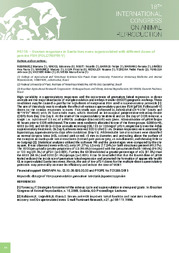Ovarian responses in Santa Ines ewes superovulated with different doses of porcine FSH (FOLLTROPIN-V).
Ovarian responses in Santa Ines ewes superovulated with different doses of porcine FSH (FOLLTROPIN-V).
Author(s): RODRIGUEZ, M.; MACIEL, G.; NOCITI, R.; BARROS, F.; MARIANO, R.; SIMÕES, A. P.; MARONEZI, M.; SILVA, P.; WENDLER, R.; TEIXEIRA, P. P.; FONSECA, J. F. da; VICENTE, W.; OLIVEIRA, M. E.
Summary: Absttract: High variability in superovulatory responses and the occurrence of premature luteal regression in donor animals are the major drawbacks of mutiple ovulation and embryo transfer (MOET) programs in sheep. These conditions may be caused in part by the high doses of exogenous FSH used in superovulatory protocols [1]. The aim of this study was to evaluate the effect of various superovulatory porcine FSH (pFSH, Folltropin®-V) doses on the ovarian responses in ewes. This study was performed in Jaboticabal (21º15?18?? South and 48º19?19?? West) with 29 Santa Inês ewes, which received an intravaginal progesterone-releasing device (CIDR) from Day 0 to Day 8. At the start of the superovulatory treatment and on the day of CIDR removal, a single i.m. injection of 0.5 mL of a PGF2? analogue (Sincrocio®) was given. Administration of pFSH began 48 hours prior to CIDR withdrawal. The ewes were randomly allocated to one of the three groups: G200 (n=9), G133 (n=10), and G100 (n=10) or animals receiving 200, 133 or 100 mg of pFSH, respectively over the 4-day superovulatory treatment. On Day 6, all ewes received 300 IU of eCG i.m. Ovarian responses were assessed by laparoscopy, approximately six days after ovulations (Day 15). All detectable luteal structures were classified as normal corpora lutea (nCL, colored pink or red, >5 mm in diameter, and protruding above the surface of the ovary) or as inadequate luteal structures (colored pale pink or grey,
Publication year: 2016
Types of publication: Abstract in annals or event proceedings
Unit: Embrapa Goats & Sheep
Observation
Some of Embrapa's publications are published as ePub files. To read them, use or download one of the following free software options to your computer or mobile device. Android: Google Play Books; IOS: iBooks; Windows and Linux: Calibre.
Access other publications
Access the Agricultural Research Database (BDPA) to consult Embrapa's full library collection and records.
Visit Embrapa Bookstore to purchase books and other publications sold by Embrapa.

